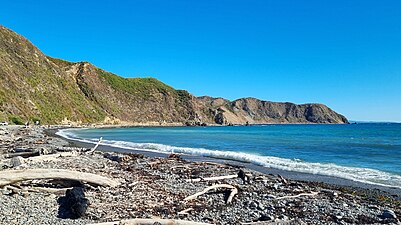Mākara Beach
Mākara Beach | |
|---|---|
 Mākara beach | |
 | |
| Country | New Zealand |
| City | Wellington |
| Local authority | Wellington City Council |
| Electoral ward | Wharangi/Onslow-Western Ward[1] |
| Community board | Mākara/Ōhāriu Community Board[2] |
| (Tasman Sea) |
|
Ohariu |
| Mākara |
Mākara Beach,[3] previously spelled Makara Beach, is a suburb of Wellington, New Zealand, consisting of a small seaside village and its surrounding countryside. The Wellington City Council regards it as a separate suburb to Mākara.
Features
[edit]Mākara Beach is a seaside village, 20 minutes drive from the suburb of Karori.[4] It has a parking area for beach visitors.[5] The beach is suitable for fishing and diving, and is a designated off-lead dog exercise area.[6]
The suburb is accessed through Makara Road, which enters the suburb in the south and continues north alongside Makara Stream until it reaches the coast at Ohariu Bay. This is the main bay of the suburb; the suburb also includes Warehou Bay and Smiths Bay.[3] Makara Stream's estuary is described by Wellington City Council as "an important native ecosystem and is gradually being restored by the Makaracarpas, a local environmental group."[6] The Makara Foreshore Reserve was once an area of sand dunes. In 1942, these dunes were bulldozed based on fears that invading Japanese could hide in them. Rare plants are gradually re-establishing themselves in the area.[6]
There is a 7 km walkway, managed by the Department of Conservation, that starts from the village. It follows the beach and goes through farmland up to historic gun emplacements.[7]
History
[edit]Mākara Beach had a resident community of fishermen in the 19th and 20th century, using solid clinker-built dinghies. Fisherman Leopold Haupois, known as French Louis, had arrived from Normandy in France in 1875; in the 1930s Lady Bledisloe the wife of the Governor-General used to visit French Louis to practise her French conversation.[8]
Throughout the mid 1980s, the village was used as the fictional town Kaihoro in Peter Jackson’s 1987 film Bad Taste.
Mākara Beach was hit by Cyclone Gita in 2018. Homes were flooded and property was destroyed. The following year, a plan was announced to protect the village from future weather events due to climate change. The plan's recommendations included raising the beach's crest level, constructing a sea wall, clearing gravel from the stream's mouth, and reinforcing its bank.[9][5]
During the national COVID lockdown in April 2020, residents erected a barricade and signs to keep visitors from the rest of Wellington out. While one resident said, "All we're doing is what the police are doing...telling people to go home", a lawyer told media that the public could not block roads and this could be a criminal offence.[4]
Flooding in 2021 damaged a road which leads to Mākara Beach. It was estimated that repairs would cost NZD 1.5 million. This route to the suburb was closed for several weeks.
Demographics
[edit]Mākara is part of the Mākara-Ohariu statistical area.[10]
-
Mākara Beach village from the coastal walkway.
-
Ohariu Bay and Mākara Beach
-
Looking west along the coast of Ohariu Bay from Mākara Beach.
External links
[edit]- "Italian fisherman at Makara Beach, 1900s (photo)". National Library of New Zealand. 1900.
References
[edit]- ^ "Ward maps and boundaries". Wellington City Council. Retrieved 24 January 2022.
- ^ "Mākara/Ōhāriu Community Board". Wellington City Council. Retrieved 24 January 2022.
- ^ a b "NZGB Gazetteer". gazetteer.linz.govt.nz. Retrieved 16 December 2021.
- ^ a b "Visitors go home: Locals build cordon to keep outsiders away during lockdown". Stuff. 31 March 2020. Retrieved 17 December 2021.
- ^ a b Woolf, Amber-Leigh (7 February 2019). "Wellington seaside village hatches climate change plan after Cyclone Gita mayhem". Stuff. Retrieved 23 March 2020.
- ^ a b c "Makara Beach". Wellington City Council. 28 January 2021. Retrieved 17 December 2021.
- ^ "Mākara Walkway". www.doc.govt.nz. Retrieved 17 December 2021.
- ^ Johnson, David (1990). Wellington by the Sea: 100 Years of Work and Play. Auckland: David Bateman. pp. 109–111. ISBN 1-86953-040-3.
- ^ "Gita smashes Wellington seaside village, flooding houses and destroying property". Stuff. 21 February 2018. Retrieved 17 December 2021.
- ^ 2018 Census place summary: Mākara-Ohariu



